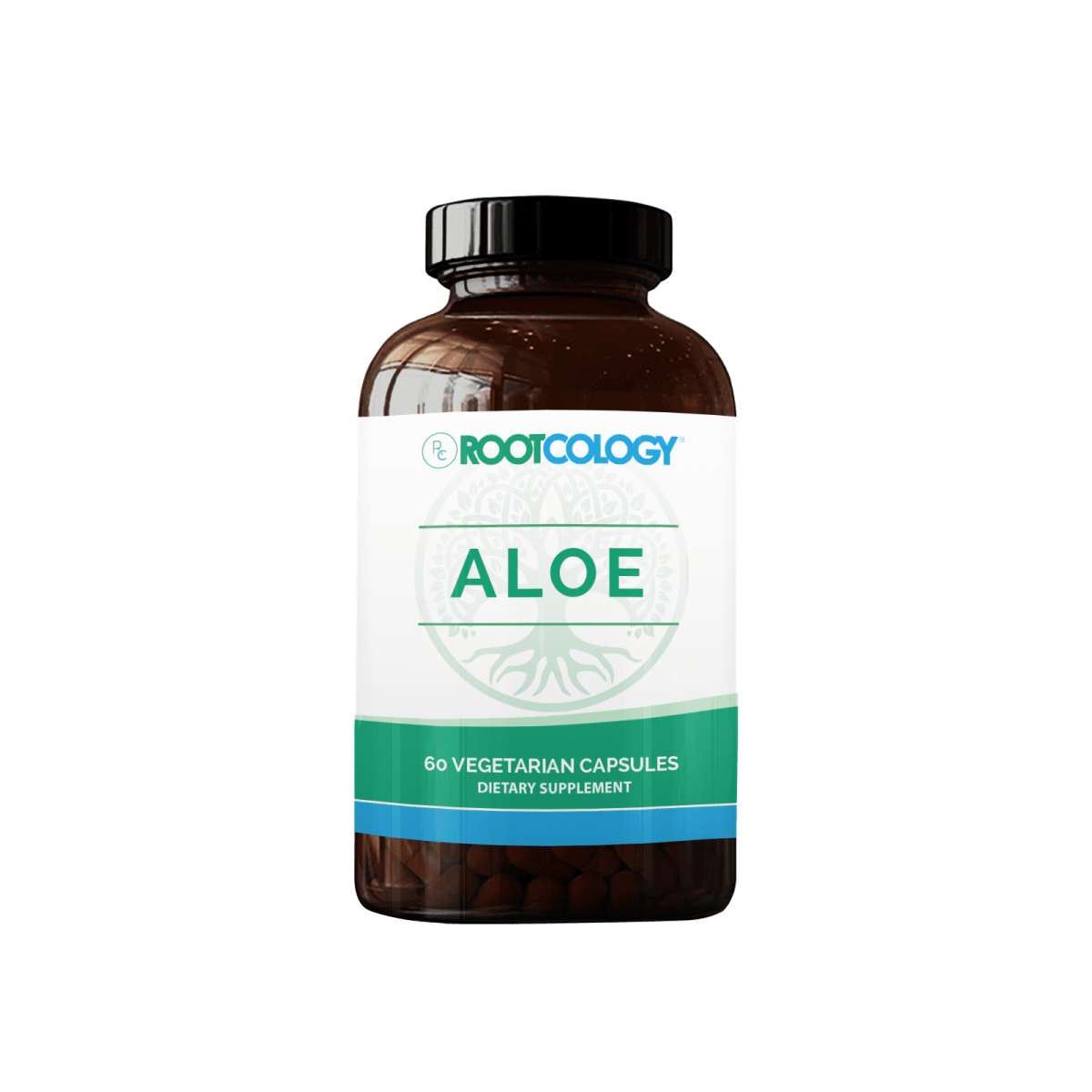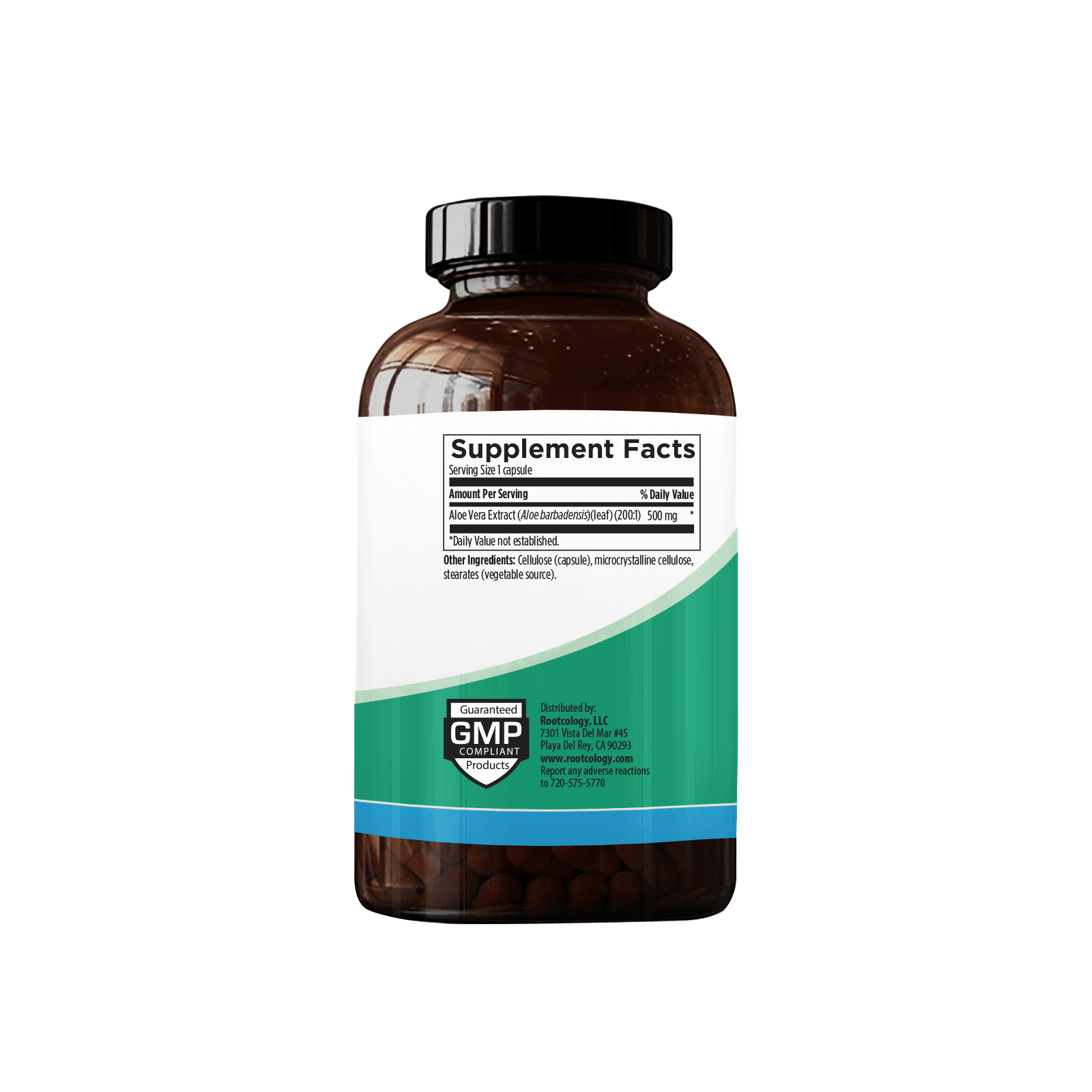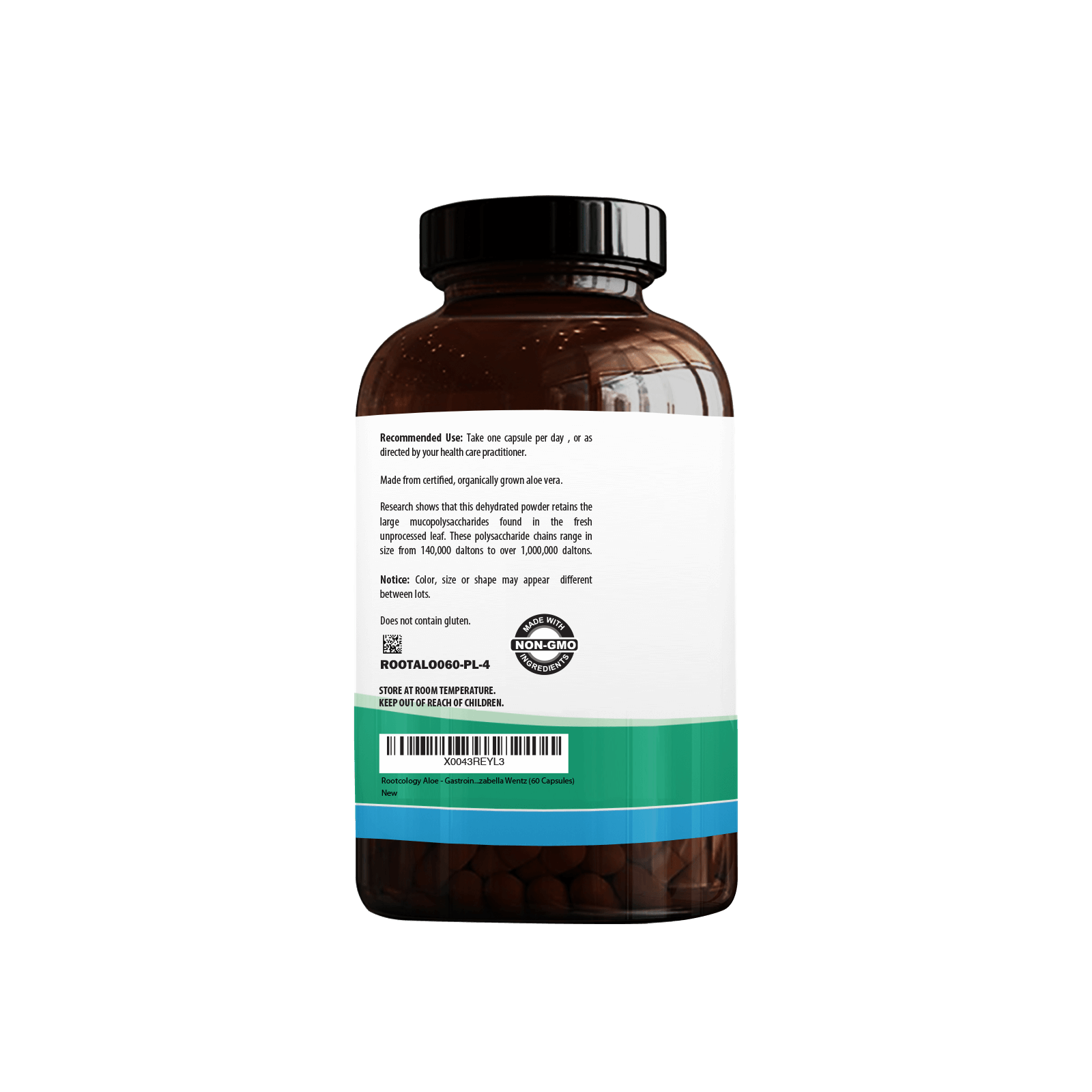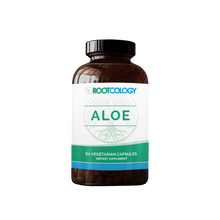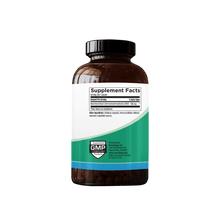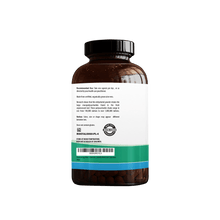What are the ingredients in Rootcology Aloe?
This supplement contains 100% highly concentrated aloe vera powder. In fact, it takes 200 pounds of aloe vera gel to make one pound of this nourishing aloe extract! It is also prepared using a low-heat dehydration method with no filtering, which ensures that the plant’s beneficial components (long polysaccharide chains) and its natural makeup, remain intact as much as possible.
What are the benefits of Aloe?
Aloe vera may be beneficial for anyone wishing to maintain normal thyroid hormone levels, support healthy digestion, maintain normal bowel movements, support immune function, maintain blood sugar balance, and maintain a healthy stress response.*
What is the recommended dose?
The recommended dose is one capsule per day.
When should I take it?
Aloe can be taken once per day, with or without food.
How long can I take Aloe?
Nine months to two years as part of TPO & TG Support.* Can be taken long-term for maintenance, if helpful
Can it be taken with thyroid medications?
Aloe is safe to take with thyroid medications, but be sure to space them out by at least one hour. Research has shown that aloe vera can lead to a reduction in TSH when used over time, so it is recommended to test thyroid hormones every 30-90 days while using this supplement, to see if a medication adjustment is needed.*
What are the precautions with anthraquinones?
Some individuals may be sensitive to anthraquinone compounds, which are present in aloe latex (taken from the outer skin of the plant) and aloe whole leaf extracts. Due to its laxative effect, aloe latex may also cause a loss of minerals, such as potassium and sodium. However, anthraquinone is removed in the processing of Rootcology’s Aloe, effectively eliminating the laxative component. Random testing confirms that the anthraquinone content for Rootcology's Aloe (measured as aloin) is below a detection limit of 0.1 ppm.
Rootcology’s Aloe is not recommended for those with latex allergies. Anthraquinones and certain proteins in aloe latex may cross-react with the proteins found in natural rubber latex (similar to cross-reactions between latex and foods like bananas or avocados). While random testing confirms that the Aloin results for our Aloe are below the detection limit, we err on the side of caution for those with latex allergies, especially if the allergy is severe.
What are the precautions with aloin?
One study reported the component aloin (found in aloe vera latex) to have carcinogenic activity. In this study, aloe vera (whole-leaf extract) caused intestinal irritation and acted as a carcinogen within the large intestine of rats. However, the concentration, as well as the strength, was over ten times the amount that someone would take in a daily dose, equaling a very high dose of 14.4 grams. Additionally, this study used whole-leaf extract (which contains the aloe latex from the outer rim, as well as the gel from the inside of the plant), which is different from the aloe vera that I recommend. (Rootcology Aloe contains less than 0.1 ppm of aloin, as it is removed in the processing.)
Can aloe be used to help heal the gut?
Aloe vera (the active ingredient in Rootcology Aloe) contains enzymes and sugars that can help maintain a balanced digestive system by supporting a healthy inflammatory response, as well as promoting beneficial bacteria in the gut.* (3, 7)
What is the difference between aloe vera juice and the aloe vera powder (made from aloe gel) used in Rootcology’s Aloe capsules?
Aloe juice contains the highest levels of anthraquinone compounds that will increase bowel motility and can cause a laxative effect, which can be a concern for some individuals, especially those who already tend to have loose bowels; whereas the aloe vera gel used to make Rootcology’s aloe vera powder, is rinsed to remove remnants of aloin (the laxative ingredient in the latex). Rootcology Aloe is tested for anthraquinone content (measured as aloin), which is below the detection limit of 0.1 ppm. Since our Aloe is prepared using a low-heat dehydration method with no filtering, this ensures that the plant’s beneficial components (long polysaccharide chains) and its natural makeup, remain intact as much as possible.
Not to be used by those who are pregnant or breastfeeding, diabetic, or have a bowel obstruction. Do not use if you are allergic or sensitive to latex+ or any of the ingredients in this supplement. Discontinue use at least two weeks prior to undergoing surgery.
Please check with your healthcare provider before using if you have intestinal issues such as Crohn’s disease or ulcerative colitis.
DO NOT TAKE if taking the following medications: anticoagulant/antiplatelet drugs, antidiabetic medications, blood thinners, corticosteroids including prednisone and prednisolone, cardiac glycoside drugs (e.g. digoxin), diuretic medications, sevoflurane, or stimulant laxatives.
+This product is not recommended for those with latex allergies. Aloin (aloe latex) is a compound classified as an anthraquinone that comes from a thin layer of yellow sap that separates the outer rind from the inner gel-like portion of the leaf. Anthraquinones and certain proteins in aloe latex may cross-react with the proteins found in natural rubber latex (similar to cross-reactions between latex and foods like bananas or avocados). While random testing confirms that the Aloin results for our Aloe are below the detection limit of 0.1 ppm, we err on the side of caution for those with latex allergies, especially if the allergy is severe.
- Surjushe A, Vasani R, Saple DG. Aloe vera: A short review. Indian J. Dermatol. 2008;53:163166. doi: 10.4103/0019-5154.44785.
- Nahar T, Uddin B, Hossain S, Sikder AM, Ahmed S. Aloe vera gel protects liver from oxidative stress-induced damage in experimental rat model. J complement Integr Med. 2013. May 7;10. doi: 10.1515/jcim-2012-0020.
- Yongchaiyudha S, Rungpitarangsi V, Bunyapraphatsara N, Chokechaijaroenporn O. Antidiabetic activity of Aloe Vera L. Juice. I. Clinical trial in new case of diabetes mellitus. Phytomedicine. 1996 Nov;3(3):241-3.
- Nagpal R, Kaur V, Kumar M, Maratta F. Effect of Aloe Vera juice on growth and activities of Lactobacilli in-vitro. Acta Biomed. 2012 Dec;83(3):183-8.
- Panahi Y, Khedmat H, Valizadegan G, Mohtashami R, Sahebkar A. Efficacy and safety of Aloe vera syrup for the treatment of gastroesophageal reflux disease: a pilot randomized positive-controlled trial. J Tradit Chin Med. 2015 Dec;35(6):632-6.
- Bugdaci M, Zuhur S, Sokmen M, Toksoy B, Albayrak B, Altuntas Y. The Role of Helicobacter pylori in Patients with Hypothyroidism in Whom Could Not be Achieved Normal Thyrotropin Levels Despite Treatment with High Doses of Thyroxine. Helicobacter. 2011;16(2):124-130. doi:10.1111/j.1523-5378.2011.00830.x.
- Metro D, Cernaro V, Papa M, Benvenga S. Marked improvement of thyroid function and autoimmunity by Aloe barbadensis miller juice in patients with subclinical hypothyroidism. J Clin Transl Endocrinol. 2018;11:18-25. doi:10.1016/j.jcte.2018.01.003
- Park MY, Kwon HJ, Sung MK. Evaluation of aloin and Aloe-emodin as anti-inflammatory agents in Aloe by using murine macrophages. Biosci. Biotechnol. Biochem. 2009; 73(4): 828-832.
- Resch U, Helsel G, Tatzber F, Sinzinger H. Antioxidant status in thyroid dysfunction. Clin Chem Lab Med. 2002;40:1132-1134.
- Boudreau MD, Mellick PW, Olson GR, Felton RP, Thorn BT, Beland FA. Clear evidence of carcinogenic activity by a whole-leaf extract of Aloe barbadensis miller (aloe vera) in F344/N rats. Toxicol Sci. 2012;131(1):26-39.
You May Also Like
Questions about Rootcology Products? Email info@rootcology.com and we will get back to you within 24 business hours.




